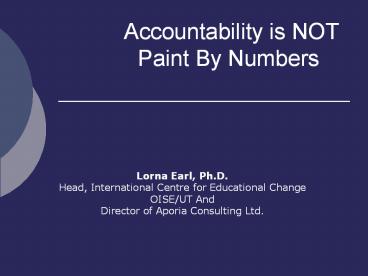Lorna Earl, Ph.D. PowerPoint PPT Presentation
1 / 19
Title: Lorna Earl, Ph.D.
1
Accountability is NOT Paint By Numbers
- Lorna Earl, Ph.D.
- Head, International Centre for Educational Change
- OISE/UT And
- Director of Aporia Consulting Ltd.
2
Possible Titles
- Being Accountable Measuring Effectiveness and
Improvement in Schools - School Effectiveness and Improvement Research
Implications for Policy, Practice and
Accountability - Accountability Surveillance or Improvement
- Everything That You Always Wanted to Know about
Accountability But Were Afraid To Ask
3
Accountability Let Me Count the Ways
- Accountability as Conversation
- Accountability and Improvement
- Accountability is not Paint By Numbers
4
What is Accountability?
- Responsibility and Entitlement.
- Who is accountable?
- To Whom?
- For What?
- In What Manner? and
- Under What Circumstances?
- Wagner (1989)
5
Accountability By whom To whom For what?
Responsibility of Responsibility of Responsibility of
Entitlement to Central Government District/LEA School Administrators/Teachers
General public/ taxpayers quality of educational programs quality of educational programs quality of program and program delivery
cost effectiveness cost effectiveness judicious and efficient use of resources
equity of policies, structures and programs equity of policies, structures and programs equity of policies, structures and programs
Individual parents and students quality of educational programs quality of educational programs individual student learning
cost effectiveness cost effectiveness fair and equitable treatment
equity of policies, structures and programs equity Appeal process
6
Accountability In what manner?
- Accounting - gathering, organizing and reporting
information that describes performance - Accountability - the conversation about what the
information means and how it fits with everything
else that we know and about how to use it to make
positive changes
7
Changing Roles in Accountability
- Researchers Communicate research in ways that
make the findings accessible use and the
consequences defensible. - Educators Learn to live with data, use it and
like it.
8
Accountability and Improvement
- Accountability without improvement is empty
rhetoric - Improvement without accountability is whimsical
action without direction
9
Accountability Under what conditions?
- Monitoring and Improvement
- Pressure and Support
- Accountability and Capacity-building
10
(No Transcript)
11
Indicator Categories
12
PAINTING A GALLERY OF IMAGES
Setting the Canvas
Planning This Picture
Blocking the Canvas
The First Strokes
The Image Grows
- What do we know?
- Where do we want to go?
- Establishing role, purpose, and audience
- Matching planning goals to indicator categories
- From indicator categories to actual and potential
data sources
- Examining, interpreting and displaying data
- Formulating key messages
- Clarifying the messages and supporting evidence
- Delivering the message
- Checking audience reaction
13
Capacities for Leaders in a Data-Rich World
- Develop an Inquiry Habit of Mind
- Become Data Literate
- Create a Culture of Inquiry
14
A Leader with an Inquiry Habit of Mind
- Values deep understanding
- Reserves judgment and has a tolerance for
ambiguity - Takes a range of perspectives and systematically
poses increasingly focused questions
15
A Data Literate Leader
- Thinks about purpose
- Recognises sound and unsound data
- Is knowledgeable about statistical and
measurement concepts - Makes interpretation paramount
- Pays attention to reporting and to audiences
16
A Leader who Creates a Culture of Inquiry
- Involves others in interpreting and engaging with
the data - Stimulates an internal sense of urgency
- Makes time
- Uses critical friends
17
Internal Capacity for Change
- Internal capacity is the power to engage in and
sustain continuous learning of teachers and the
school itself for the purpose of enhancing
student learning. - Stoll (1999)
18
- If you make a change and it feels comfortable,
you havent made a change. - Lee Trevino
19
- Never doubt that a small group of thoughtful and
committed citizens can change the world. In
fact, it has never happened any other way. - Margaret Mead

